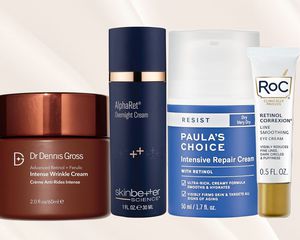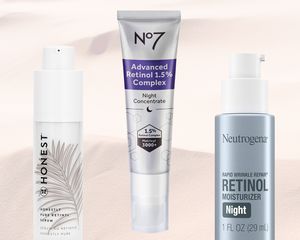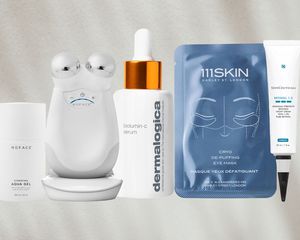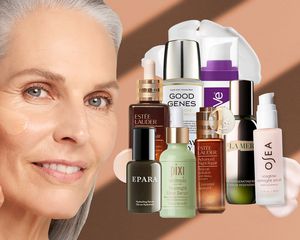:max_bytes(150000):strip_icc()/Stocksy_txp18d72a78KG4300_Medium_3032836-513e993308404a25a2c2cc9c9541f118.jpg)
OHLAMOUR STUDIO / Stocksy
Every era has its own iteration of magic in a bottle. Given all the hype surrounding retinol, we can safely say it's the famed beauty elixir of our time—purported to turn back the clock on our skin and reverse the signs of aging. But despite its household notoriety, it seems that many are unsure of what the ingredient actually does and whether or not it truly works. Add on a few anecdotal incidents of irritation and sensitivity dubbed "retinol purge," and you have quite the sensational skincare tonic. The one thing we are sure of? We're all interested but uninformed.
To get educated (and, of course, live our best wrinkle-free lives), we spoke to two top dermatologists and a celebrity esthetician for the full rundown on retinol. They helped answer everything we ever wanted to know about using retinol in our skincare routines, including why, how, and when to use it, which products to get, and precautions to follow.
Meet the Expert
- Maryann Mikhail, MD, is a board-certified dermatologist, a fellow of the American Academy of Dermatology, and the owner of Waverly DermSpa in Fort Lauderdale, Florida.
- Rachel Nazarian, MD, is a board-certified dermatologist, fellow of the American Academy of Dermatology, and Assistant Clinical Professor at Mount Sinai Hospital.
- Renée Rouleau is an esthetician and the founder and creator of her eponymous skincare line.
Keep scrolling for the answers to every retinol question you’ve ever asked and for expert advice on how to add this powerful anti-aging ingredient to your skincare routine.
What Is Retinol?
Retinol is a type of retinoid, a derivative of vitamin A, used for anti-aging and found in many skin care products. Though many people are under the impression that retinol is an exfoliant, it’s an antioxidant. Mikhail says that for the actual ingredient (retinol) to work on skin, it has to go through two steps. “It's converted to retinaldehyde, and then to the active form retinoic acid,” she explains. However, if you're using a retinol ester, it will have to go through three steps to become active because it must be converted to retinol first. “Once retinoids are converted to the active form, retinoic acid, they get incorporated into cells in and under your skin to influence how they behave. Pure retinoic acid is available by prescription (tretinoin), while you can get retinol esters, retinol, and retinaldehyde over the counter,” says Mikhail. “The closer you are to retinoic acid, the better it works, but also the more drying and irritating.” In other words, retinaldehyde is strongest, then retinol, then retinol ester.
Retinol
Type of ingredient: Exfoliant
Main benefits: Increases cell turnover, boosts collagen production, and regulates oil production.
Who should use it: In general, anyone looking to reduce the signs of skin aging. Retinol is not recommended for women who are pregnant, planning to be, or nursing. Those with eczema or rosacea that's flaring should not use retinol.
How often can you use it: Start with twice a week to prevent irritation. Because sunlight deactivates retinol, apply it at night, followed by a moisturizer.
Works well with: Hydrating cleansers, niacinamide, hyaluronic acid, and ceramides.
Don’t use with: Heavy scrubs, astringents, toners, alpha hydroxy acids, beta hydroxy acids, benzoyl peroxide, and vitamin C, as doing so may irritate the skin.
“Using a well-formulated and stable product with retinol will visibly reduce the appearance of sun damage, brown spots, lines, wrinkles, and large pores. It can stimulate the metabolism of skin cells and encourage collagen production,” explains Rouleau. “Its magic is in its ability to resurface the skin’s texture for a smoother, more even-toned look.”
What's the Difference Between Retinol, Retin-A, and Retinoid?
Nazarian says that both Retin-A and retinol are in the class of medications known as retinoids. “Both can help with promoting faster skin cell turnover, and both are proven options for helping reverse signs of skin aging,” she says. “But over-the-counter retinol requires conversion in the skin to the active form, while Retin-A is a prescription product that is more potent and slightly more effective at diminishing wrinkles and fighting acne. You will need to speak to a dermatologist about getting a prescription.”
“Retin-A restores the organization of cells through cellular turnover in the epidermis, so they are less likely to fall into the pores and block them—resulting in fewer clogged pores and small breakouts,” says Rouleau. “It also improves the look of wrinkles by retexturing and smoothing the skin’s surface and reducing pore size.”
Benefits of Using Retinol
Retinol has many benefits; in fact, Mikhail says, “I often tell patients that if they do nothing else, they should use retinol and sunscreen.”
- Reduces signs of aging: Because retinol enhances skin cell turnover, you may notice a more youthful quality to your skin.
- Improves the texture of your skin: By boosting collagen production, your skin will have more structure and strength. Plus, the cells on the surface of your skin will be replaced more quickly, helping smooth your skin and reduce the dull, dry look of dead skin.
- Evens skin tone: Retinol can not only smooth the texture of your skin but the tone as well. “With continued use, retinol works to fade hyperpigmentation (brown spots and patches) and give the look of smoother skin in a gentler, non-drying way than a prescription form,” explains Rouleau.
- Clears acne: Retinol decreases the function of overactive oil glands and unclogs pores. Mikhail says this clears skin, makes pores look smaller, and prevents breakouts. Plus, it may boost the potency of active ingredients in other acne-fighting medications, so if you use it in conjunction with other cleansers, you might see amplified results.
- Boosts collagen production: This helps reduce the appearance of fine lines, wrinkles, and skin laxity. “At the same time, it prevents the loss of the collagen and elastin we already have by slowing the enzyme that breaks them down,” says Mikhail.
- Reverses the effects of sun damage: The antioxidants in retinol can help repair sun-damaged skin, such as lightening dark spots.
Potential Side Effects of Retinol
“The side effects of retinol are that it can cause dryness, peeling, and irritation,” says Mikhail, who adds that women who are pregnant, planning, or breastfeeding should not use retinol. “Retinoids can only be damaging to skin if you have a super-sensitive underlying skin condition like eczema or rosacea and can flare and enhance inflammation,” says Nazarian. “Still, patients with sensitive conditions like rosacea may still be able to use a retinoid, but they need to gradually introduce it into their skincare regimen, perhaps only one time weekly, and prep their skin with a topical moisturizer before applying the retinoid."
“It can make your skin more sensitive to other products, procedures, and sunlight,” notes Mikhail. “Don't use harsh scrubs, astringents, toners, alpha hydroxy acids, beta hydroxy acids, benzoyl peroxide, and vitamin C at the same as your retinol [because the] combinations can dry out and irritate your skin.”
Mikhail says that you’ll need to stop applying retinol for at least a week before things like getting a facial, laser treatment, chemical peel, waxing, or intense sun exposure because it increases your sensitivity. And, if you must go in the sun, there are some important sun-exposure precautions. “If you would like to use a retinoid in the summertime, it’s imperative that you wear a high-SPF, broad-spectrum sunscreen daily,” suggests Nazarian. “Along with sunscreen, because your risk for burning is so high, I would avoid peak hours of sun and wear a broad-brim hat when outdoors.”
Different Types of Retinol
Retinol comes in cream, gel, serum, spray, and lotion forms. “In general, gels and sprays are more drying, while lotions, serums, and cream forms are more hydrating,” explains Mikhail. “If you have oily skin at baseline, you might start with a gel or spray. For combination skin, a lotion or serum might be best. If you're dry, choose a cream.” She says these are general guidelines that can vary according to the season and climate as well. “You might need a cream in the cold and something lighter in warm, humid weather,” Mikhail explains.
Byrdie Tip
“Most retinoids are not photo-stable or sunlight-stable, meaning they should be kept in an opaque, well-sealed container and used only at night,” explains Rouleau.
In addition to the various forms, retinol also comes in varying strengths. Generally, if the concentration isn’t specifically labeled, it probably means it's less than 0.25 percent. As per Mikhail’s advice, if you’re just starting with retinol, you should pick a product with a concentration of 0.25 percent or less. “You can work your way up the ladder as tolerated. Once you've gotten used to over-the-counter options, you can request a prescription-strength retinoid from your dermatologist.”
How to Use Retinol
It can take weeks to months to see results from retinol, depending upon your skin concern, so be patient. Mikhail says it’s best to start with a very simple retinol routine. “In the morning, use a gentle cleanser, and then a moisturizer and a sunscreen,” she advises. “At night, wash with a gentle cleanser, and then apply the retinol, followed by moisturizer.”
Our experts all say it’s essential to give your skin a chance to adjust to retinol. Begin with applying it just once or twice a week on non-consecutive nights. “Gradually increase how often, but not how much, you are using based on how your skin responds. If any redness or irritation is noted the next day, you should skip that night’s application,” says Rouleau. She says to then work up to using the retinol for two nights on, one night off, alternating with an exfoliating acid serum and a nourishing treatment serum. “Since retinol is pushing up skin cells to the surface at a faster rate, retinol can cause micro-peeling (invisible peeling) in most skin types, so it’s important not to use it every night.”
Rouleau continues, “Because it takes two days for the cells to regenerate to the surface and cause the skin to get flaky, using an exfoliating serum on [the third night] is perfect for removing the surface dead cells that appear. Also, retinol may work even better when used back on the skin on [fourth night], because now it can penetrate deeper into the skin because of the acid exfoliation the night before.” She says that a hydrating serum is added to the mix once a week to give the skin a break and calm the skin with ingredients that nourish and repair the skin barrier. “It’s also important to do it this way simply because the skin performs its best when it has a variety of high-performance ingredients instead of the same one ingredient night in and night out,” explains Rouleau.
Though our experts recommend starting by using the retinol just once or twice a week on non-consecutive nights to prevent irritation, Mikhail says, “If your skin tolerates it well, you can slowly work your way up to using it every night.” And, she has some advice if your skin isn’t taking well to retinol alone. “If you find your skin is sensitive, peeling, or irritated, don't lose hope. You can try the sandwich technique—first apply a hyaluronic acid serum, then the retinol over it, and then a moisturizer with ceramides on top.”
Mikhail says that once your skin has adjusted to the retinol, you can add an antioxidant like vitamin C in the morning under sunscreen. But, it’s important to heed her sage advice: “Always start [with] one product at a time to see how your skin reacts before adding another.”
For the actual retinol application, Mikhail shares additional guidance: “Take a pea-sized amount and dab onto five points—the forehead, nose, each cheek, and chin. Gently rub it in to evenly distribute it over the face. Use a second pea-sized amount for the neck and décolletage.”
The Final Takeaway
It's rare to see a buzzy skincare ingredient actually live up to the hype, but retinol can certainly hold up to even the most intense scrutiny. The superhero antioxidant does work to visibly turn back the clock, reducing the appearance of fine lines, sun damage, and hyperpigmentation all while stimulating collagen production and cellular turnover. Just tread carefully into this fountain of youth, gradually building up tolerance to its famed potency.




